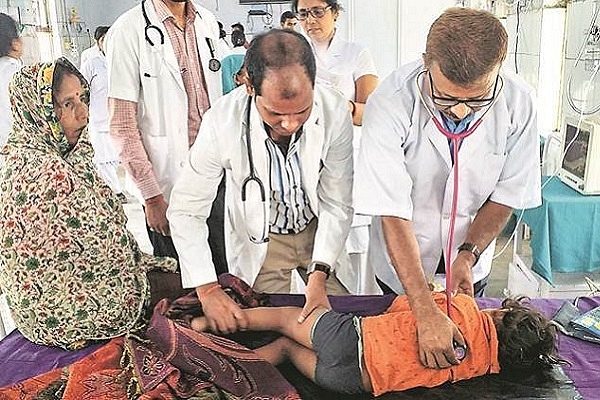Insta
Death Toll At 126: Encephalitis Outbreak Linked To A Toxic Ingredient In The Lychee Fruit Plus Low Blood Sugar In Kids

Doctors treating Encephalitis patient (@DDNewsLive/Twitter)
Bihar Chief Minister Nitish Kumar today (18 May) visited the Sri Krishna Medical College and Hospital in Muzaffarpur district to take stock of the situation in the wake of 126 children deaths due to Acute Encephalitis Syndrome (AES). This is the Chief Minister’s first visit to the district since the outbreak of AES.
Of the 126 deaths, 108 have been reported from Muzaffarpur and the surrounding areas. 89 deaths were reported from Sri Krishna Medical College and Hospital and 19 in Kejriwal Hospital.
Chief Minister Nitish Kumar had earlier expressed grief over the children’s death in Muzaffarpur and ordered payment of Rs 4 lakh as ex gratia to the next of the kin of the deceased.
The Chief Minister also directed the officials of the Health Department and the district administration as well as doctors to take all possible measures to tackle the disease. The chief minister prayed for a speedy recovery of the children suffering from suspected AES.
Muzaffarpur’s outbreak is different, as it is not the classical infectious encephalitis that occurs in some states in the monsoon months.
Press Trust of India quoted V Ravi, Senior Professor and Head (Neurovirology), NIMHANS as saying that the mid-summer encephalitis outbreak in this region is linked to a toxic ingredient in the lychee fruit coupled with low blood sugar in children.
AES may be caused by organisms (bacteria, virus), toxins etc and are treated/managed depending on the causative agent. Although lychee is said to have many good properties, problem arises when children have it on an empty stomach.
“Children pick up fruits from the ground and bite the seed too that has the toxin. Schools are closed for summer, so children don’t get their midday meals. They end up going to sleep on an empty stomach. The toxin and low blood sugar are fatal for the child,” explains Ravi, who has about four decades of experience working on encephalitis cases and is presently wrapping up a five-year study on its prevalence in West Bengal, Uttar Pradesh and Assam.
The study is funded by the United States Centres for Disease Control and Prevention. “It is dramatic, as the child slips into a coma and dies the next day,” he says.
The health department officials maintained that a majority of the victims, most of whom were below 10 years of age, had fallen prey to hypoglycemia, a condition caused by a very low level of blood sugar and electrolyte imbalance.
Since 1 June, 197 children were admitted to the SKMCH while 91 were taken to Kejriwal Hospital with suspected AES, but most of them were found to be victims of hypoglycemia.
(Inputs from PTI)
Introducing ElectionsHQ + 50 Ground Reports Project
The 2024 elections might seem easy to guess, but there are some important questions that shouldn't be missed.
Do freebies still sway voters? Do people prioritise infrastructure when voting? How will Punjab vote?
The answers to these questions provide great insights into where we, as a country, are headed in the years to come.
Swarajya is starting a project with an aim to do 50 solid ground stories and a smart commentary service on WhatsApp, a one-of-a-kind. We'd love your support during this election season.
Click below to contribute.
Latest